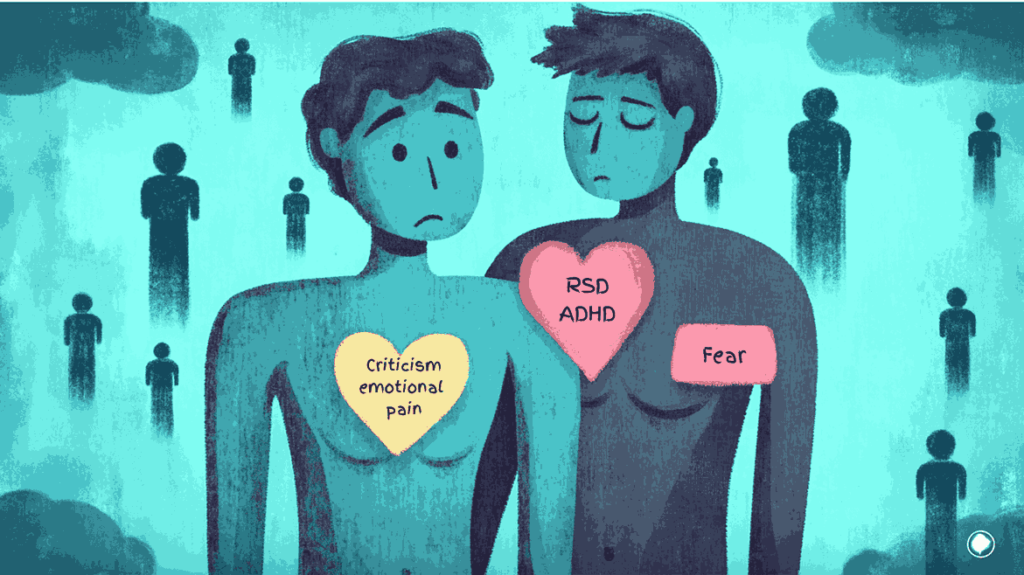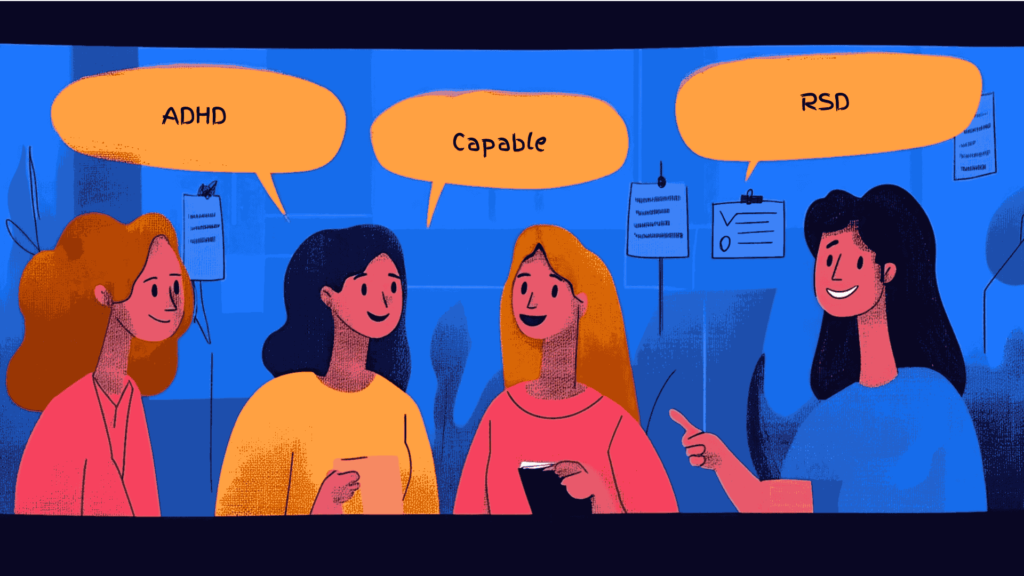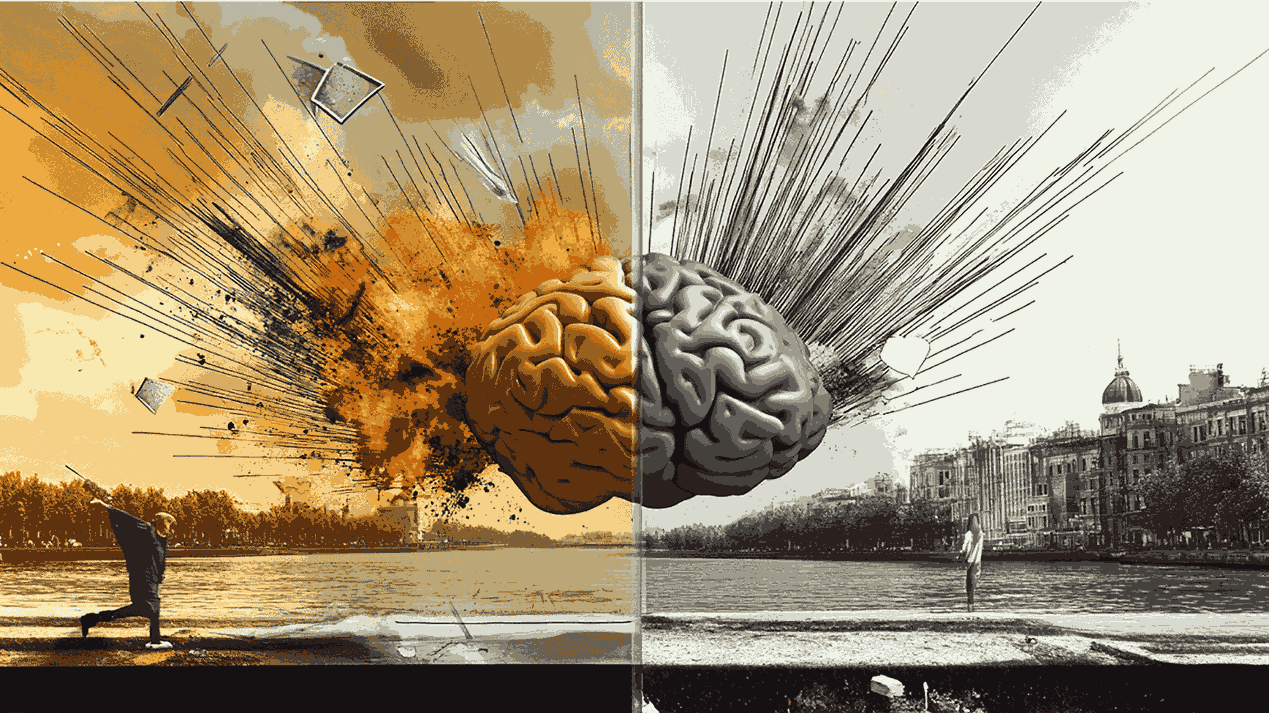All About ADHD and Rejection Sensitive Dysphoria
Understanding ADHD (Attention-Deficit/Hyperactivity Disorder) Definition and Symptoms of ADHD Attention-Deficit/Hyperactivity…
Understanding ADHD (Attention-Deficit/Hyperactivity Disorder)
Definition and Symptoms of ADHD
Attention-Deficit/Hyperactivity Disorder (ADHD) is a neurodevelopmental disorder characterized by persistent patterns of inattention, hyperactivity, and impulsivity. Many people with ADHD also experience Rejection Sensitive Dysphoria (RSD).
People with ADHD may struggle to focus, follow through on tasks, or control their impulses. Common symptoms include:
- Difficulty organizing tasks and activities
- Frequent forgetfulness
- Fidgeting or restlessness
- Interrupting others during conversations
Many people often share stories about misplacing their keys for the umpteenth time or zoning out during meetings, both of which can be frustrations linked to ADHD.
Causes and Risk Factors
The exact causes of ADHD are not fully understood, though several factors appear to play significant roles:
- Genetics: ADHD often runs in families, suggesting a hereditary basis.
- Brain Structure: Differences in brain regions responsible for controlling attention and impulses have been noted in those with ADHD.
- Environmental Factors: Exposure to tobacco smoke, alcohol, or drugs during pregnancy may increase risk.
While every individual’s experience is unique, understanding these elements can help tailor effective management strategies.
Diagnosis and Treatment Options
ADHD is usually diagnosed through a comprehensive evaluation, including interviews, behavior rating scales, and psychological testing. Treatment varies and often includes:
- Behavioral Therapy: Helps individuals learn coping strategies and organizational skills.
- Medications: Stimulant medications, like methylphenidate and amphetamines, can help manage symptoms.
- Lifestyle Changes: Incorporating routines, physical activity, and healthy eating can significantly impact overall well-being.
For many, recognizing the reality of ADHD opens the door to effective coping strategies, enabling them to thrive rather than merely survive.[1][2]

Rejection Sensitive Dysphoria (RSD)
What is RSD?
Rejection Sensitive Dysphoria (RSD) refers to an intense emotional pain or discomfort that occurs in response to perceived rejection or criticism. Imagine feeling the weight of an emotional punch every time you think someone disapproves of you. This overwhelming response can lead to feelings of sadness, anger, or even rage, which can be hard to regulate.
Relationship Between RSD and ADHD
RSD is closely linked to Attention-Deficit/Hyperactivity Disorder (ADHD). Many individuals with ADHD experience heightened emotional sensitivity, making them more vulnerable to RSD. The neurological differences in individuals with ADHD affect their ability to manage rejection-related emotions effectively. For example, a minor critique might trigger a significant emotional response, making even the most resilient among them feel as if their world is crumbling.
Impact of RSD on Individuals
The impact of RSD can be profound and far-reaching, affecting various aspects of life:
- Low Self-Esteem: Individuals often struggle with self-worth, feeling inadequate after each perceived rejection.
- Relationship Strains: Maintaining healthy relationships can be challenging, as fear of rejection leads to avoidance behaviors.
- Avoidance of Opportunities: The fear of failure or criticism may prevent someone from pursuing goals, leading to unfulfilled potential.
Recognizing RSD is the first step toward managing it effectively, allowing individuals to reclaim control over their emotional responses. [3][4]
Link Between ADHD and Rejection Sensitivity
Exploring the Connection
The connection between Attention-Deficit/Hyperactivity Disorder (ADHD) and Rejection Sensitive Dysphoria (RSD) is a complex interplay of neurological factors and emotional sensitivities. Individuals with ADHD often experience heightened emotional responses due to differences in brain structure and function, particularly in areas regulating emotions. This heightened sensitivity can lead to an overwhelming fear of rejection or criticism, making everyday interactions feel like potential minefields.
How RSD Manifests in Individuals with ADHD
For those with ADHD, RSD can manifest in various ways:
- Intense Emotional Reactions: Minor setbacks can evoke feelings of helplessness or rage.
- Avoidant Behavior: Many may shy away from social situations to escape potential criticism.
- Perfectionism: The constant drive to meet others’ high expectations can lead to anxiety.
Understanding how these emotional dynamics play out helps individuals recognize and manage their feelings, fostering healthier interactions with themselves and others. [5][6]

Coping Strategies for Dealing with Rejection Sensitivity
Recognizing Triggers and Patterns
Understanding your triggers is crucial in managing Rejection Sensitive Dysphoria (RSD). Common triggers might include receiving criticism, disagreements with friends, or even vague interactions where the outcome feels uncertain. For instance, consider how a simple comment can escalate from constructive feedback to an emotional crisis. By keeping a journal of your experiences, you can identify patterns in your emotional responses over time. This technique allows you to anticipate and better manage your reactions, giving you a greater sense of control.
Building Resilience and Self-Esteem
Resilience and self-esteem are essential components in coping with RSD. Focus on your strengths by creating a list of your achievements and positive qualities. This can serve as a powerful reminder during tough moments. You might also practice affirmations like “I am capable” or “I deserve respect.” Engaging in mindfulness exercises can help you acknowledge and process your feelings without judgment, turning the experience of rejection into an opportunity for growth rather than despair. Over time, these strategies can significantly bolster your emotional fortitude, allowing you to navigate life with greater confidence. [7][8]
Seeking Support and Professional Help
Therapy and Counseling Options
Seeking support from a therapist can be transformative for individuals grappling with Rejection Sensitive Dysphoria (RSD) and ADHD. Therapy provides a safe space to explore emotions, understand triggers, and develop coping strategies. Here are some effective options:
- Cognitive Behavioral Therapy (CBT): Helps reframe negative thoughts and reduce emotional distress.
- Dialectical Behavior Therapy (DBT): Focuses on emotional regulation and mindfulness techniques.
- Support Groups: Connecting with others who share similar experiences can foster understanding and validation.
For example, many find that sharing their feelings in a supportive group can alleviate some of the isolation caused by RSD, offering a sense of community and solidarity.
Medication Management for ADHD and RSD
Medication can play a crucial role in managing both ADHD and RSD. Stimulants like methylphenidate (Ritalin) or amphetamine-based medications can help regulate attention and impulsivity. Additionally, off-label use of medications such as clonidine or guanfacine may help reduce RSD symptoms.
Here’s a brief overview:
- Stimulants: Enhance focus and decrease impulsivity.
- Alpha Agonists: May alleviate emotional dysregulation and symptoms of RSD.
- Antidepressants (MAOIs): Can assist in managing mood-related symptoms that overlap with RSD.
Consulting a healthcare provider for personalized recommendations is key, as they can tailor treatment plans to meet individual needs effectively. [9][10]

Lifestyle Changes and Self-Care Practices
Importance of Healthy Habits
Adopting healthy habits can significantly enhance the overall well-being of individuals living with Rejection Sensitive Dysphoria (RSD) and ADHD. Simple lifestyle changes can help mitigate the intense emotional pain associated with rejection. A few essential habits to consider include:
- Regular Exercise: Physical activity releases endorphins, which can improve mood and reduce anxiety levels.
- Balanced Nutrition: Eating a diet rich in whole foods supports brain health and emotional stability.
- Adequate Sleep: Prioritizing restful sleep is crucial for emotional regulation and cognitive function.
For example, someone might find that a morning routine of stretching and healthy breakfast not only energizes them physically but also sets a positive tone for their day.
Stress Management Techniques
Effective stress management is key in combating the emotional upheaval RSD can bring. Implementing techniques such as:
- Mindfulness Meditation: This practice helps you stay present and reduces overwhelming feelings.
- Breathing Exercises: Simple techniques like deep breathing can slow down your responses during stressful moments.
- Journaling: Writing about your feelings can provide clarity and lessen the emotional burden.
These strategies can empower individuals to regain control over their emotional responses, leading to a healthier mindset and improved quality of life. [11][12]
Navigating Relationships with ADHD and RSD
Communicating Effectively
Effective communication is vital when navigating relationships for individuals with ADHD and Rejection Sensitive Dysphoria (RSD). It’s common to misinterpret casual comments or body language as rejection, leading to emotional turmoil. To combat this, consider the following strategies:
- Clarify Intentions: Don’t hesitate to ask your partner for clarification if you feel sensitive to their words. For example, “Did something I said upset you?”
- Use “I” Statements: Focus on expressing your feelings without placing blame. You might say, “I feel anxious when I sense a change in your tone.”
- Practice Active Listening: Give your partner your full attention and repeat back what you’ve heard to confirm understanding.
These practices can foster deeper connections and reduce misunderstandings.
Setting Boundaries and Seeking Understanding
Setting healthy boundaries is crucial in managing the emotional challenges posed by ADHD and RSD. It’s important to communicate your needs openly. Consider these steps:
- Identify Comfort Levels: Take time to assess what feels acceptable for you in your relationships. What topics or behaviors trigger your RSD?
- Communicate Clearly: Share your boundaries with those close to you. For example, “I need some time to myself after work to decompress.”
- Encourage Open Dialogue: Foster a space where both you and your partner can share feelings without fear of judgment. This could involve regular check-ins where both partners discuss their emotional status and needs.
By practicing these strategies, you can nurture understanding and create a supportive environment that allows both partners to thrive, despite the challenges posed by ADHD and RSD. [13][14]

Overcoming Social Challenges
Peer Relationships and Social Interactions
For individuals dealing with ADHD and Rejection Sensitive Dysphoria (RSD), maintaining healthy peer relationships can feel daunting. The fear of rejection often leads to social withdrawal, which can worsen feelings of isolation. To counter this, consider:
- Participating in Group Activities: Joining clubs or groups can provide a supportive environment where you feel more at ease interacting with peers.
- Setting Small Goals: Focus on initiating a brief chat or attending social events for a short period. Gradually increasing your exposure can reduce anxiety.
- Practice Active Listening: Concentrating fully on the speaker can help shift the focus away from your fears of rejection.
For example, starting with low-pressure environments like study groups may help ease you into more complex social interactions.
Workplace Issues and Strategies for Success
Navigating workplace dynamics can also be challenging for those with ADHD and RSD. The intensity of emotional reactions to feedback or criticism can impact job performance. Utilize these strategies:
- Seek Constructive Feedback: Approach feedback conversations with a mindset ready to receive input, focusing on growth rather than personal failure.
- Establish Clear Communication: Communicate your needs to colleagues, so they understand your sensitivities and can offer support when needed.
- Use Affirmations: Remind yourself of your professional strengths and successes to combat feelings of inadequacy.
By taking proactive measures, individuals can gradually build confidence and foster a supportive work environment that acknowledges and accommodates their unique needs. [15][16]
All About ADHD and Rejection Sensitive Dysphoria
